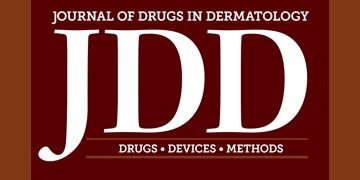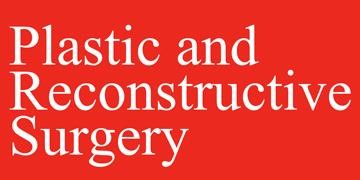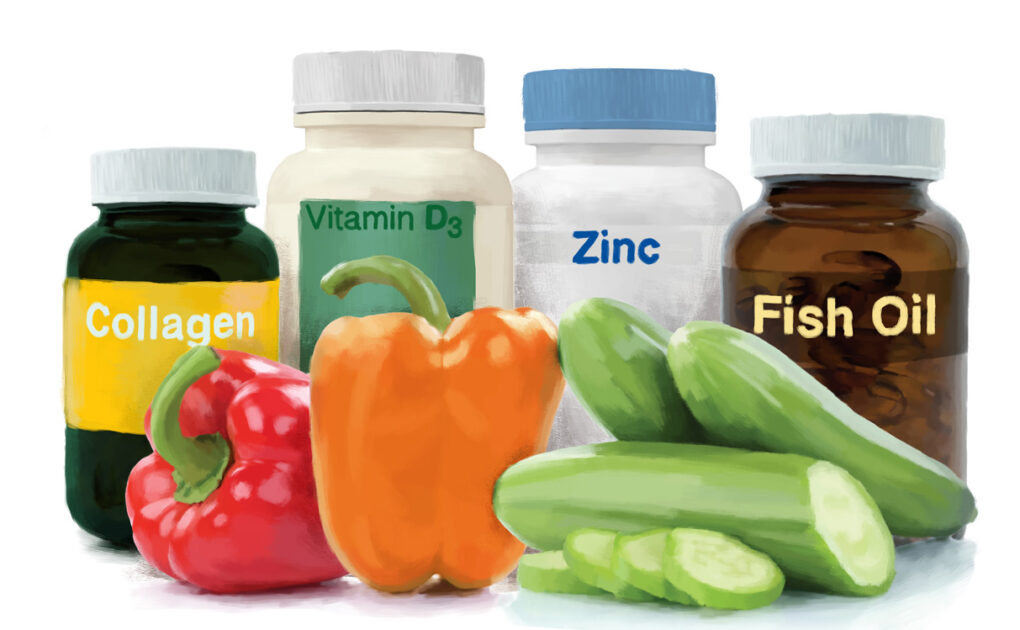Eat a Colorful Diet Rich in Fruits, Veggies, and Omega-3 Fatty Acids, Get Your Vitamin D and Zinc Levels Checked, and Consider Collagen Supplements

The Essential Info
The best way to prevent acne scars is to treat your acne early and to avoid picking at lesions. However, what you eat can also help support your body in healing acne lesions quickly and with minimal scarring. Keep in mind that while good nutrition can help give your body its best fighting chance against new acne scars, diet alone is unlikely to make a dramatic difference. And unfortunately, what you eat can’t improve any scars you already have.
Research shows that eating a balanced diet that contains carbohydrates, proteins, and fats, as well as micronutrients like vitamin A, zinc, and iron should give the body the elements it needs for proper wound healing. In addition, some preliminary evidence suggests that collagen supplements might help speed up healing and improve the appearance of scars.
Our advice: Eat a colorful diet with lots of fruits, vegetables, and omega-3 fatty acids, and ask your doctor to test you for vitamin D and zinc deficiency. If it turns out you are deficient in vitamin D and/or zinc, your doctor will likely recommend supplements. Following these recommendations should kill two birds with one stone by helping with acne and supporting your skin during wound healing. In addition, consider taking collagen supplements to help reduce new scarring, but keep your expectations realistic.

The Science
- The 3 Phases of Wound Healing
- Nutritional Elements That Support Wound Healing
- Some Promising Early Evidence on Collagen Supplements
A healed acne lesion often leaves a scar, because the skin can’t repair itself to look exactly the same as it did before the acne lesion developed. Unfortunately, scars are permanent: various treatments may improve their appearance but can rarely remove them completely. In view of this, it’s especially important to try to prevent the formation of scars in the first place, and the best way to do that is by treating acne early.
While treating acne to minimize scarring is key, we can also try to tip the odds in our favor by giving the body all the nutrients it needs for optimal wound healing. Acne lesions are small wounds, and how well they heal determines whether the lesions end up leaving scars.
Let’s take a quick look at the three phases of wound healing to help us understand how nutrition can best support the body through this process.
The 3 Phases of Wound Healing
Wound healing occurs in 3 overlapping stages:
- Inflammation: Inflammation is the process underlying acne itself as well as the first stage of acne lesion repair. We can see the signs of inflammation as redness, swelling, and pain at the lesion site. The role of inflammation is to activate cells that will clean up the damaged skin at the lesion and to summon other cells that will rebuild the skin in the second phase.
- Cell proliferation: In this phase, skin cells grow (“proliferate”) quickly to replace cells that were damaged in the acne lesion. At the same time, the skin starts to build a temporary “matrix,” which will eventually become the deeper layer of the skin. An important element of this matrix is the protein collagen, which makes the skin firm and supple. During the cell proliferation phase, an immature form of collagen starts to fill in the wound.
- Remodeling or maturation: In this phase, the skin remodels the temporary matrix into the more permanent connective tissue that will ultimately form the deeper layer of the skin. A key part of the remodeling is replacing the immature collagen formed in the second phase with a mature form.1
Multiple studies have investigated the role of diet in wound healing.1-5 While no studies have looked at acne lesions specifically, scientists believe that the same principles hold true for all wound types.2 In other words, the lessons learned from other types of wounds can tell us what to eat to help our acne lesions heal with as little scarring as possible. However, for scars that have already formed, it’s unlikely that nutrition can improve the appearance of these scars in any way.
Let’s take a look at which nutritional elements appear to be important for wound healing, and therefore, for the healing of acne lesions.
Nutritional Elements That Support Wound Healing

Research suggests that the following nutritional elements are important for proper wound healing:
- Macronutrients: Macronutrients are nutrients the body needs in large amounts. They include:
- Carbohydrates: Carbohydrates provide energy for wound healing, especially during the cell proliferation phase. Note: While complex carbohydrates like those found in whole grains are great sources of energy, simple sugars like those in candy can lead to a spike in blood sugar. A rapid rise in blood sugar is not ideal for wound healing because it can make the body more prone to infections.
- Fats: Fats can supply additional energy for wound healing. Fats are also an important component of cells, so they are necessary for the cell proliferation phase. In addition, fats ensure the absorption of fat-soluble micronutrients like vitamin A, omega-3 fatty acids, and omega-6 fatty acids.
- Protein: Proteins are the building blocks of our bodies, so they are crucial for all stages of wound healing. Of particular importance is collagen, so we will look at it in more detail in a moment.1,2
- Micronutrients: Micronutrients are nutrients that the body only needs in small amounts, but they still play an important role in wound healing. They include:
- Vitamin A: Vitamin A seems to be necessary for both the inflammation and remodeling phases of wound healing. Without it, the formation of collagen is impaired.1,2 Feel free to eat plenty of colorful fruits and vegetables, which are rich in vitamin A. However, avoid taking vitamin A supplements, because this vitamin can build up in the body and become toxic.
- Vitamin C: Vitamin C is an antioxidant, which means it keeps damaging toxins called free radicals at bay during the healing process. In addition, researchers believe that Vitamin C affects inflammation and collagen production.1,2
- Omega-3 and omega-6 fatty acids: Some research suggests that these fatty acids are helpful during the inflammatory phase of wound healing.2 Omega-3 fatty acids are mainly found in fish, fish oil, and some nuts and seeds. A wide variety of foods, such as beans, corn, eggs, and meat, contains omega-6 fatty acids.
- Zinc: Zinc is an antioxidant and may also help with wound healing by regulating skin regrowth and repair. Many people with acne have a zinc deficiency, so ask your doctor for a quick blood test to find out whether you are deficient. If so, your doctor will likely recommend a supplement.2 Fun fact: oysters are by far the best food source for zinc.
- Selenium: Like zinc, selenium is an antioxidant that may regulate skin regrowth and repair. There is currently no evidence that selenium should be supplemented, however. Instead, you can obtain selenium from eating seafood, brazil nuts, and organ meats like liver and intestines.
- Iron: Iron is also an antioxidant and might help with wound healing. However, there is some evidence that taking iron supplements may have an unwanted effect on wound healing by prolonging inflammation.2 In addition, iron supplements can be toxic if you are not already deficient in this element. Therefore, talk to your doctor before attempting to self-medicate with iron.
- Amino acids: Amino acids are a building block of proteins and also play a role in regulating inflammation. Currently, scientists believe that amino acids are only useful to wound healing if they come from protein in the diet rather than separately in the form of supplements.2
- Water: Water is necessary for maintaining the skin’s elasticity. During wound healing, adequate water intake allows for normal circulation of blood to the wound. Water also helps with the removal of wastes from the wound during the inflammation phase. While any kind of fluids provide water, pure water is best. Alcohol, on the other hand, can slow down wound healing, so avoid obtaining a significant amount of your fluid intake from alcoholic drinks.2 Use your thirst as a signal to tell you when you need to up your water intake, but don’t force yourself to drink water if you don’t feel thirsty. Research suggests that extra hydration will just make you run to the bathroom more but won’t make any difference to your skin.
Eating a balanced diet that includes these nutritional elements will support the body as it heals existing acne lesions and may help reduce future scars. However, it is unlikely that what you eat can improve scars that have already formed.
Some Promising Early Evidence on Collagen Supplements
As we have seen, collagen is a key component of healthy skin and plays an essential role in refilling the wound when an acne lesion heals. Therefore, a few studies have investigated whether collagen supplements might help with wound healing and improve the appearance of skin that is aged, wrinkled, or too dry.

Recently, a group of researchers combed through 11 studies on collagen supplementation for skin conditions like ulcers (a type of wound that is slow to heal), dry skin, cellulite, and wrinkles. The studies included a grand total of 805 participants. The review authors published their conclusions in the Journal of Drugs in Dermatology in 2019.
The scientists concluded that oral collagen supplements improve the amount of collagen in the deep layer of the skin and make the skin more elastic. They wrote, “Based on the limited number of studies available, preliminary results are promising for the short-term and long-term use of oral collagen supplements for wound healing and skin aging.”3 The researchers also noted that the supplements had caused no side effects.
These findings are encouraging because they suggest that collagen taken in the form of supplements does end up in the skin, where it can potentially help with wound healing. However, none of the studies looked at acne scars, so more research is necessary to tell us whether collagen supplements can really prevent or treat these types of scars.
In addition, one study looked specifically at whether collagen supplements might speed up wound healing and improve scar quality. Rather than acne scars, the researchers studied scars from abdominoplasty (also known as “tummy tuck” surgery).

The study was published in the journal Plastic and Reconstructive Surgery in 2018. Out of 33 patients who underwent abdominal plastic surgery, 25 patients received a supplement containing 230 mg of collagen as well as protein, selenium, and other micronutrients. The patients took one capsule a day starting the day before surgery and continuing for three months after surgery. The remaining 8 patients received no supplement. One year after the surgery, the researchers compared the patients’ surgical scars and found that scars had healed faster and looked better in the patients who took the supplement.
However, this is a very small study that would need to be repeated with more patients. In addition, we cannot be sure that collagen alone was responsible for the improved wound healing in the patients who took the supplement, since the supplement also contained other beneficial compounds.4
The results of these studies suggest that collagen supplements might be worth considering to give your acne a better chance of healing with less scarring. However, you are unlikely to see dramatic results from collagen supplements, so keep your expectations realistic, and don’t spend a fortune on supplements. Keep in mind that you can also obtain collagen from food sources like fish, chicken, egg whites, and citrus fruits.
Types of Acne Scars and Why They Form
As we have seen, when the skin rebuilds itself after an acne lesion, it needs to replace damaged skin cells with new ones as well as refill the wound with collagen. A scar forms when the wound is filled with either too little or too much collagen, resulting in the two main types of acne scars:
- Indented (atrophic) scars: These scars contain less collagen than the surrounding skin, making them appear sunken-in. Indented scars are the most common type of acne scars. The three kinds of indented scars are icepick scars, boxcar scars, and rolling scars.
- Raised (hypertrophic or keloid) scars: These scars contain more collagen than the surrounding skin and are therefore raised above the skin surface. Hypertrophic scars are raised scars that do not grow beyond the edges of the original lesion. Keloid scars, which are less common, may extend past the original lesion and can even keep growing over time.6,7
References
- Barchitta, M., Maugeri , A., Favara, G., Magnano, San Lio, R., Evola, G., Agodi, A. & Basile, G. Nutrition and wound healing: An overview focusing on the beneficial effects of curcumin. Int J Mol Sci. 20(5):1119 (2019). https://pubmed.ncbi.nlm.nih.gov/30841550/
- Quain, A. M. & Khardori, N. M. Nutrition in wound care management: A comprehensive overview. Wounds. 27, 327-35 (2015). https://pubmed.ncbi.nlm.nih.gov/27447105/
- Choi, F. D., Sung, C. T., Juhasz, M. L. & Mesinkovsk, N. A. Oral collagen supplementation: A systematic review of dermatological applications. J Drugs Dermatol. 18, 9-16 (2019). https://pubmed.ncbi.nlm.nih.gov/30681787/
- Haiun, M., Barbara, H., Durazzo, A., Sid-Ahmed-Mezi, M. & Meningaud, J. P. Improving abdominal plastic scars with a dietary supplement – A comparative study. Plast Reconstr Surg Glob Open. 6(10):e1907. (2018). https://pubmed.ncbi.nlm.nih.gov/30534486/
- Guo, S. & Dipietro, L. A. Factors affecting wound healing. J Dent Res. 89, 219-29 (2010). https://pubmed.ncbi.nlm.nih.gov/20139336/
- Connolly, D., Vu, H. L., Mariwalla, K. & Saedi, N. Acne scarring – pathogenesis, evaluation, and treatment options. J Clin Aesthet Dermatol. 10, 12-23 (2017). https://pubmed.ncbi.nlm.nih.gov/29344322/
- Abdel Hay, R., Shalaby, K., Zaher, H., Hafez, V., Chi, C. C., Dimitri, S., Nabhan, A. F. & Layton, A. M. Interventions for acne scars. Cochrane Database Syst Rev. 4(4):CD011946 (2016). https://pubmed.ncbi.nlm.nih.gov/27038134/
- InformedHealth.org [Internet]. Cologne, Germany: Institute for Quality and Efficiency in Health Care (IQWiG); 2006-. Acne: Overview. 2013 Jan 16 [Updated 2019 Sep 26]. Available from: https://www.ncbi.nlm.nih.gov/books/NBK279211/
 Acne.org Products
Acne.org Products